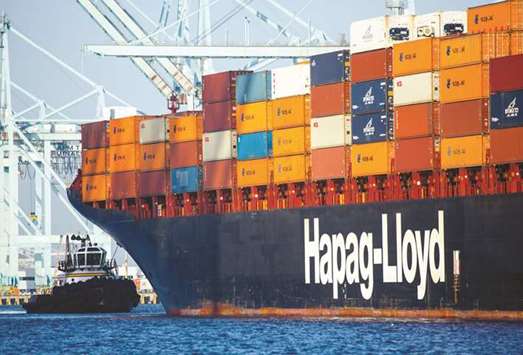Investors in Europe’s junk bond market are buying the riskiest type of corporate debt at the fastest pace in years as the region’s record-low yields fuel demand for lower-rated securities.
Companies sold €1.5bn ($1.7bn) of notes with ratings of at least seven levels below investment grade last week - or five above default and among the lowest available - according to data compiled by Bloomberg. That’s the busiest week since April 2014 and already the most for a full month in more than two years, the data show.
German shipper Hapag-Lloyd boosted its sale of seven-year bonds last week to €450mn from a planned €300mn, and lowered the yield to 5.125% from about 5.25%. That compares with the Hamburg-based company’s last bond sale, when it issued five-year notes at 6.75%. Both bonds are rated Caa1 by Moody’s Investors Service.
“Shipping deals are a good bellwether that the market may be peaking,” said James Tomlins, a London-based high-yield money manager at M&G Investments, which oversees about £265bn. “Banks and sponsors see this as a good time to market and investors are swallowing it because they’re desperate for yield.”
Creditors are buying more of the lowest-rated bonds and accepting less compensation, raising concern that they’re setting themselves up for losses.
At the same time, many companies are taking on more risk and using proceeds from debt sales to pay shareholders instead of investing the money or building a buffer for harder times.
“The risks are large when you get involved with the weaker end of the market at this point in the cycle,” said Andrew Lake, the London-based head of fixed income at Mirabaud Asset Management, which oversees about 8bn Swiss francs ($8.3bn).
“Investors could be storing themselves up for the next round of defaults in a few years’ time.”
Issuance is set to increase, with Dutch department-store operator Hema marketing €150mn of bonds rated CCC, eight levels below investment grade, according to people familiar with the matter.
The company’s 8.5% bonds due December 2019, which are rated CCC- by S&P Global Ratings, surged to about 102 cents on the euro from 44 cents a year ago, data compiled by Bloomberg show.
Kloeckner Pentaplast GmbH sold €395mn of so-called payment-in-kind toggle notes last week that allow it to pay interest with more debt. The German packaging maker will use some proceeds from the bonds, rated CCC+, to finance an acquisition and pay shareholders.
More companies are taking on debt to pay dividends, a sign for some investors that the market is overheating. Borrowers sold about €3.5bn of bonds this year to pay shareholders compared with €450mn in the same period of 2016, according to data from DebtExplained, a leveraged- finance data and analysis firm.
“We see dividends as being the absolute worst use of proceeds because the company doesn’t benefit from the financing,” said Stephen Baines, an Edinburgh-based fixed-income investment manager at Kames Capital, which manages £45bn ($58bn). “Market conditions are certainly hot right now and some of the deals coming to market are pretty low quality.”
Investors aren’t writing a blank check. French packaging distributor Antalis International postponed its debut sale of junk notes last week, citing market conditions. Last month, bondholders forced Italian cleaning contractor Manutencoop Facility Management to improve the terms and reduce the size of its junk bond offering.
Some investors are passing on initial bond sales in the hope they can buy the securities at lower prices later on. Henry Craik-White, a portfolio manager at ECM Asset Management in London, whose parent Wells Fargo Asset Management oversees $482bn, said he would prefer to buy in the secondary market “when things are rocky and the bonds trade down,” because debt with low ratings tends to be volatile.
Still, the search for yield is fuelling a surge of low-rated issuance around the world, and US sales of bonds with CCC ratings are on pace for a record year. In Europe, average yields dropped to a record 3.3% last month and the premium over government bonds is near the lowest since the financial crisis at 300 basis points, Bank of America Merrill Lynch index data show.
Companies are also taking advantage of investor appetite to refinance higher-yielding debt. Marseille-based CMA CGM, the world’s third-largest container shipping line, increased its sale of five-year notes last week to €650mn from a planned €500mn and priced the coupon at 6.5%, compared with 8.75% on bonds it refinanced.
The company’s notes rated CCC+ and due January 2021 rose to about 104 cents on the euro from 74 cents in September, data compiled by Bloomberg show.

A tug boat moves into position behind a Hapag-Lloyd container ship at the Port of Los Angeles. The German shipper boosted its sale of seven-year bonds last week to u20ac450mn from a planned u20ac300mn, and lowered the yield to 5.125% from about 5.25%.
